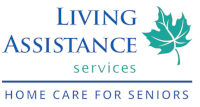Visiting the doctor can be overwhelming, especially for seniors. Older individuals have increasingly complex medical needs and subsequently, they often see more than one medical professional while managing multiple conditions or ailments. This can make it hard to keep track of appointments, prescriptions and instructions from their physician—particularly if the individual has dementia or other cognitive conditions.
Even if a senior has a high level of cognitive function and lives independently, medical appointments can feel rushed or veer off course. It’s not uncommon to forget new medical terms, mix up things a doctor has said or wish you’d asked a question that didn’t come up in conversation. Fortunately, this can be avoided with the right preparation. Here are some tips to help get the most out of your aging loved one’s next medical appointment—or even your own.
Have support in place
It helps to have a family member or trusted caregiver accompany your aging loved one to their medical appointments. Ideally, this family member will be someone who can politely and effectively advocate for your loved one while helping them answer questions about their physical and mental health. If a family member is unavailable, our caregivers can fulfil this role and report back to your family as needed.
Come prepared
Before the appointment, sit down with your loved one and make a list of any questions or concerns they have. If you have questions or concerns of your own, let them know you’d like to address these points with their doctor as well. These questions may be about physical concerns (for example, new or increased pain or decreased mobility), cognitive issues (memory loss, confusion, behavioural changes) or a specific ailment (for example, sores that aren’t healing or a potential UTI). If you have any concerns about medication they’ve been prescribed—side effects, the dosage or drug interactions, for example—write down those questions as well. If a caregiver is accompanying your loved one to their next appointment, make a copy of the list for their use and keep one for your own records.
Bring a notepad
In addition to your list of discussion points, bring a notepad to the appointment so you can jot down any key points the doctor makes. This may include new instructions for medical care, specific foods to avoid (or increase consumption of), symptoms to watch for, specialist referrals or follow up appointments. This is particularly important if multiple family members assist with your loved one’s care, as the notes can be shared between caregivers.
Schedule follow-ups right away
If your loved one is referred to another medical specialist or given a requisition for blood work, an ultrasound or other lab testing, make an effort to book these appointments right away. Between the busyness of life and delays in the medical system—even more so due to the pandemic—it’s best to handle these requests immediately to ensure the best possible care.
If your family would like support to help your loved ones live comfortably and independently in their own home, please contact us. Living Assistance Services hires skilled, dedicated caregivers to assist families in Toronto and across the greater Toronto area. We’d be pleased to offer a personalized consultation and quote for services. Thanks for reading, and please share this post with anyone who may find it helpful!

